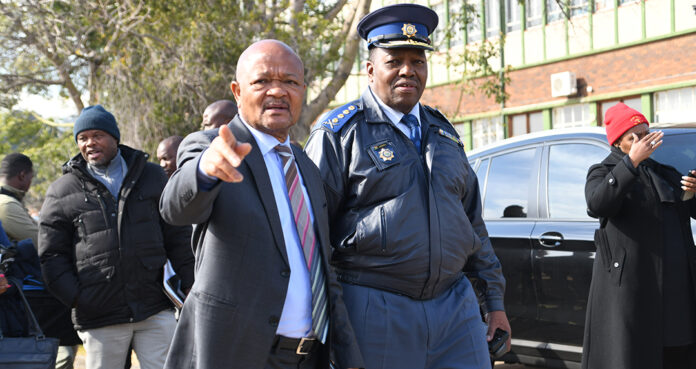National Police Commissioner Gen Fannie Masemola has accused AfriForum of brazen interference, deceit, and outright sabotage in police investigations into political killings in
KwaZulu-Natal.
Masemola made the allegations in a confidential report prepared for police minister Senzo Mchunu early this year. Mchunu has since been suspended.
The high-level document – penned on January 22 – pulls no punches that the behaviour of the Afrikaner civil society group “is tantamount to an attempt to defeat the ends of justice”.
Masemola stated that AfriForum has overstepped all bounds and threw a spanner in the works at the very moment when hard-won progress is finally within reach.
According to him, AfriForum’s representatives have hurled “insults and derogatory comments” at Lt-Gen Dumisani Khumalo and his investigative team, poisoning any hope of constructive engagement.
The sins of the investigators, stated Masemola, were that they refused to respond to
AfriForum’s request to share information with them in certain cases it claimed to be involved in.
He also charged that AfriForum has misrepresented its mandate – falsely claiming to act on behalf of both the widow of a murder victim and the uMngeni Municipality, despite lacking legal standing in either case.
“AfriForum may observe court proceedings, yes – but it has no business meddling in
police investigations,” the report insisted.
“The investigating team has declined to provide AfriForum with information or detailed progress in the investigation, which is suspected to be the reason why they are making false accusations,” asserts the SAPS report.
The report said attempts to force AfriForum to justify its purported appointment by the uMngeni Municipality have been met with silence.
Despite AfriForum’s inteference, stated the report, the task team, which was established in 2018 to probe decades-long political killings, hitmen stalking councillors, party officials, and whistleblowers alike, it has achieved notable success.
“The task team has undeniably achieved and far exceeded the purpose for which it was established. No other task team in South Africa has achieved these successes nor has been able to investigate and ensure the successful prosecution of the perpetrators of politically motivated murders,” the report declares.
The report states that 332 political cases were probed. The victims include 57 councillors, 57 political party members, 30 office bearers, and 28 municipal officials. The ANC, IFP, and NFP have borne the brunt of the carnage more than the EFF and DA, said the report.
The task team recorded arrests of 388 suspects tied to political killings – including 34 SAPS members accused of complicity or obstruction. Seventy people have been convicted and 20 life sentences were handed, while others are collectively serving 1 562 years behind bars.
Investigators have also seized 156 firearms – 54 directly linked to political hits – and uncovered evidence of municipal fraud. It also discovered that in Nongoma public funds were allegedly used to finance contract killings.
The task team also claimed a breakthrough in the University of Fort Hare murder cases.
Masemola wrote that the task team investigations were selected by the National Prosecuting Authority as South Africa’s showcase cases to the Financial Action Task Force (FATF).
The high-profile submission aimed to prove the nation’s capability to investigate and prosecute money laundering, terrorism and proliferation financing – key to South Africa’s efforts to exit the FATF “grey list” of jurisdictions under increased monitoring.
The report warned that AfriForum’s interference threatens to erode hard-won progress.
Investigators have repeatedly declined to share case details with the organisation, fearing leaks, collpase of prosecution and further complications.
In the report, Masemola warns that AfriForum’s interference has the potential to unravel everything. “New investigating officers not familiar with evidence in the dockets,
witnesses not willing to cooperate and testify due to lack of trust in new investigators, and further investigation still outstanding will be negatively affected,” the report cautions.
The report asserts that such distractions jeopardise ongoing cases – especially the 128 dockets still under investigation and 115 cases pending in court.
“New investigating officers not familiar with evidence in the dockets, witnesses not willing to cooperate and testify due to lack of trust in new investigators, and further investigation still outstanding will be negatively affected.”
With the national task team now winding down, the report recommends that its multidisciplinary, analysis-led, prosecutor-guided model serve as the benchmark going forward.
“The multi-disciplinary investigative approach applied by the national task team will be adopted and used to serve as a benchmark for the realignment of contract killings and organised crime investigations,” the report states.
Yet the report ends on a note of accomplishment. Despite “external interference”, SAPS insists the task team has redefined the fight against politically motivated violence.
“The directive by the minister of police to disband the national task team has been
noted. The initial objective and the directive by the president have been achieved with a marked decrease of political-related killings in KwaZulu-Natal as a result of this national task team’s intervention and relentless pursuit of its mandate.”



